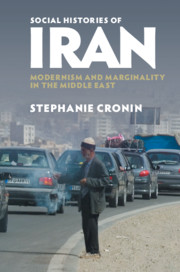Book contents
3 - The Dark Side of Modernism
The ‘Dangerous Classes’ in Iran
from Part I - Iran
Published online by Cambridge University Press: 26 January 2021
Summary
This chapter examines the transformation by which, over the final decades of the nineteenth century and the early decades of the twentieth, the urban poor of Iran and especially the “lower depths” among them ceased to be merely a permanent and occasionally troublesome presence in towns and cities, to be tolerated, managed or ignored, becoming instead a collective menace. The chapter discusses both marginality itself and the dialectical dynamic between the marginal and modernism, locating its focus on Iran within wider comparative frameworks. Using especially the work of Michel Foucault, it takes as its key players, on the one side the so-called “dangerous classes” and, on the other, their eternal adversary, the modern state, using examples drawn from Egypt, the Ottoman empire, Algeria, France and Britain to illuminate the Iranian experience. The chapter has, at its centre, narratives of the lives of various representatives of the “dangerous classes,” prostitutes, the criminal in the form of the serial killer, prisoners, the undeserving poor, beggars and paupers, and the quintessentially liminal lutis. But it also argues for the artificiality of this notion of the “dangerous classes” and its deliberate construction by a modernizing elite for whom it functioned as a mirror image, the marginal, the immoral and the criminal a perfect foil for the emerging middle classes. The chapter examines the role allocated to the marginal in the construction of modern regimes of surveillance and discipline, including avowedly “modern” police forces, prisons, judicial systems, red light districts and clinics. The chapter concludes by arguing that, far from disappearing with the triumph of modernity, the dangerous classes themselves, and the environments which supposedly produced and succoured them, are rapidly proliferating in the twenty-first century Middle East and North Africa.
- Type
- Chapter
- Information
- Social Histories of IranModernism and Marginality in the Middle East, pp. 105 - 162Publisher: Cambridge University PressPrint publication year: 2021

